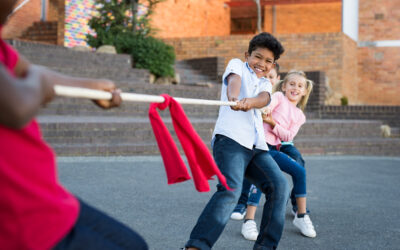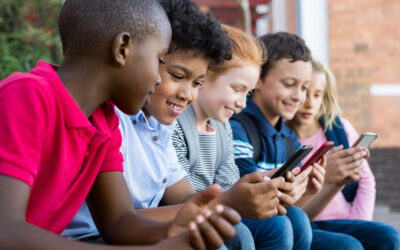Parent Perspective
Marcus’s parents are concerned about his poor social skills, his tendency to get into confrontations with peers, and his misperception of disagreements as teasing and bullying. They explain he often mistakes sarcasm for criticism. They worry that he has difficulty making and maintaining friendships.
At home, Marcus enjoys playing video games but will scream and throw objects when he loses, when other players don’t follow his instructions, or when other players tease or try to upset him with “trash talk.”
Ms. Jones’ Perspective
Marcus’s teacher Ms. Jones has similar concerns about his social skills. She has observed Marcus screaming about seemingly arbitrary things and threatening those who disagree with him. For example, he gets upset about differences of opinion over whether or not to use a pen during math. Ms. Jones has tried to help Marcus recognize the difference between bullying, arguing (e.g., whether something did or didn’t happen as reported), and differences of opinion (e.g., chocolate is better than vanilla), but has had little success.
Hear Ms. Jones share more about Marcus:
Supporting Skills
Marcus wants to get along with peers and teachers, and often tells his parents that nobody wants to be his friend. Marcus shows high motivation to make and maintain friends, enjoys social interactions with peers, and tries his best to find ways to improve his relationships, but he lacks the necessary skills.
Marcus takes most disagreements as direct personal attacks. He does not apply conflict resolution, de-escalation, or prevention strategies to reduce negative interactions with peers, and often expresses how frustrated he is about repeatedly failing to make and keep friends.
Getting Along With Peers
Like many students with autism, Marcus wants to have friends and get along with others, but has often been unsuccessful. He hears peers talking about his favorite video games, movies, and football team, but does not join in the conversation because he worries about getting into an argument. When he does attempt to join, he makes mistakes that are off-putting to his peers. For example, he recently joined a conversation peers were having about their favorite football player. He thought that saying some players “sucked” was an appropriate way to engage. His peers laughed and said he didn’t know what he was talking about, which resulted in a minor argument Marcus perceived to be an instance of bullying.
Joining Peer Activities
Marcus wants to join in on sports, activities, and games at school, but is unsure about how or when to ask. Sometimes Marcus turns his body away from his peers when asking to join; at other times, he asks to join when peers are preoccupied with part of the activity (e.g., running the bases in kickball). He struggles to understand how others perceive his behavior and, although he can identify how someone might feel about an event, he does not consistently apply this knowledge to actual situations. For instance, Marcus can explain how someone might feel when a favorite item has been stolen, but fails to understand that a peer would be angry if he borrowed an item without asking.
Body Language and Nonverbal Communication
Marcus is not aware of how body language and other nonverbal communication skills can be misunderstood by peers. He sometimes talks incessantly about water mammals, particularly the diet and migration patterns of whales, without recognizing cues from others that indicate they aren’t interested. Marcus joins conversations by attempting to shift the topic without regard to what peers were discussing.
When it comes to interaction with adults, Marcus sometimes struggles with eye contact, looking over the shoulder of adults when they speak to him. He is also apt to fidget with a ball of lint he often keeps in his pocket. Teachers mistake Marcus’s behaviors as indicators of disrespect or noncompliance instead of a sign of elevated anxiety in classes.
Marcus participated in virtual reality social skills instruction to practice his relationship skills. Ms. Jones worked to help him generalize the skills he learned in real-life settings. Click on the links below to see how Ms. Jones developed a lesson for each skill.
Marcus’s Lesson Plans
Has Skills to Deal With Bullying and Unappreciated Behavior
During VOISS lessons, Marcus learned to respond to bullying and other unwanted behavior. Specifically, he learned to ignore unwanted behavior, leave the situation, and tell a trusted adult. Ms. Jones taught him to identify supportive people and bullies, and to find...
Understands and Participates in Joking
During VOISS lessons, Marcus learned to identify situations in which people were joking. He learned to say, “That’s a good one” in response to jokes. Ms. Jones observed that Marcus was consistently responding to jokes, but only ever responded with, “That’s a good...
Understands Sarcasm and Figurative Language
During VOISS lessons, Marcus learned how to tell the differences between sarcasm and literal language. He also learned that sometimes his peers used figurative language to express themselves (e.g., “My mom has told me to clean my room like a million times”), which...
Accepts Another’s Opinion
During VOISS lessons, Marcus learned how to accept another’s opinion without getting angry or frustrated. He particularly learned these responses to promote self-calm: He could say to himself, “Some people have different opinions. I may disagree with them, but that’s...
Asks to Join In
During VOISS sessions, Marcus learned to identify pauses / breaks in activities, gain a peer’s attention by approaching them or saying their name (e.g., “Hey Steve”), and ask, “Can I join?” He learned that sometimes peers say no, and he can say, “That’s okay,” and...









